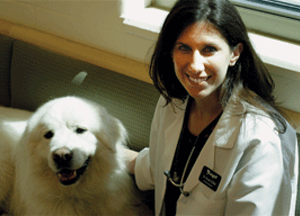-
Adopt
-
Veterinary Care
Services
Client Information
- What to Expect – Angell Boston
- Client Rights and Responsibilities
- Payments / Financial Assistance
- Pharmacy
- Client Policies
- Our Doctors
- Grief Support / Counseling
- Directions and Parking
- Helpful “How-to” Pet Care
Online Payments
Emergency: Boston
Emergency: Waltham
Poison Control Hotline
-
Programs & Resources
- Careers
-
Donate Now
 By Susan O’Bell, DVM, DACVIM (Internal Medicine)
By Susan O’Bell, DVM, DACVIM (Internal Medicine)
angell.org/generalmedicine
617-522-7282
An unfortunate reality of pet ownership is that at some point you will probably have to clean up some diarrhea. Symptoms of gastrointestinal upset can come in many shapes and forms including change in appetite (usually decreased or absent), vomiting, and/or diarrhea.
Diarrhea is a fairly broad term, and if you tell your veterinarian that your pet is having diarrhea this will likely prompt him or her to ask you several follow up questions to help sort out whether your pet is having acute or chronic diarrhea (in other words how long your pet has been experiencing these symptoms) and what we term “small bowel” vs. “large bowel” diarrhea. These are terms that describe which segment of the many “feet” of intestines is the source of the diarrhea. Because different segments of the gastrointestinal tract perform very different functions ailments affecting them can result in very different types of diarrhea.
Characteristics of small bowel diarrhea:
- Often seems like a large amount of diarrhea (although any amount can seem like too much!)
- Often very malodorous (aren’t most feces?!)
- The pet often has diarrhea with the same frequency he would normally defecate, i.e. once or twice a day
- If it becomes chronic, can result in significant dehydration and/or weight loss
- Consistency is often very watery
 Characteristics of large bowel diarrhea:
Characteristics of large bowel diarrhea:
- Often characterized by smaller amounts of diarrhea at a time
- Increased frequency compared to normal frequency of defecation
- Often accompanied by a sense of urgency (fecal accidents even in a typically house-trained pet)
- Defecation accompanied by straining
- Feces sometimes accompanied by mucous and/or fresh blood (red)
Frequent phone calls to our hospital are from clients whose pet is suddenly overcome with diarrhea. Many times this is “large bowel diarrhea” also referred to as colitis. Fortunately many cases of diarrhea are self-limiting (they resolve on their own in spite of our interventions or even if we don’t intervene), and many cases do not result in major illness for our pets (they often have their normal appetites and normal to only slightly subdued activity levels).
What causes acute colitis?
The most common causes of acute colitis are:
- Dietary indiscretion (ranging from an abrupt change in dog food brands, the introduction of new treats, getting into the garbage, or even “over indulgence”)
- Stress (not as well defined in terms of actual cause, but we hear of so many pets who break with diarrhea when they are boarding or their owners are away we think stress plays some role here)
- Internal parasitism (Giardia, prevalent in Massachusetts, is one of the more common of the GI parasites that can cause colitis in dogs, but other/any GI parasites could result in diarrhea as a symptom). We often think of parasitism as a cause particularly in puppies or young/active/social dogs.
- Viral (ranging from GI specific viruses that are mild/self-limiting to more serious infections)
How can I treat acute colitis?
When in doubt, call your veterinarian. We can help you sort out if this is something for which you need a visit or something we can try to have you manage at home first. It is a good idea to start collecting fecal samples for submission. Fecal tests check for the eggs or other life stages of various internal parasites. Because not all identifiable life stages are shed in every fecal sample sometimes a test will come back “normal” or “negative” even in the face of true parasitism. Your veterinarian may use his or her judgement to decide if empiric treatment for parasites is worthwhile depending on your pet’s history, age, duration, or type of symptoms.
While you are waiting to speak with someone at your veterinary hospital, you could try introducing a bland diet and restricted diet. When pets have colitis they often have normal appetites even if they seem a little out of sorts (acting restless, whining). An easily digestible, fat restricted diet containing a fermentable fiber source may help the GI tract recover quickly. Unless your pet has a known allergy we often recommend something along the lines of a “BRAT” diet used in humans recovering from a stomach bug; you could offer a few of ounces of thoroughly cooked, plain chicken breast (no skin, no bones, no sauce) and boiled white rice. Small portions offered every few hours is better tolerated in GI recovery than two larger meals per day. We also have more balanced versions of GI recovery diets available at the veterinary hospital that can be sent home or used in hospitalized patients.
Please refrain from offering any over-the-counter medications or previously prescribed medications you may have at home without a discussion with your veterinary professional. Medications like Imodium or Pepto-Bismol, though they may have a place in treatment in select cases are rarely recommended for use in dogs or cats. Your veterinarian may offer specific medications to help resolve diarrhea, “dewormers” if GI parasites are diagnosed or suspected, pre/probiotics to help restore or maintain healthy GI flora, and/or prescription diets.
Try to avoid abrupt diet changes. If your pet experiences GI distress after changing brands of food too quickly, it may be beneficial to mix the previous food back in (if available) or switch to bland diet until symptoms have resolved.
In the case of colitis brought on by boarding or other stressors, your pet may benefit from regular use of pre/probiotics, or a source of highly fermentable fibers in their regular diet. If recurrent bouts of diarrhea are becoming a pattern for your pet, let your veterinarian know in case this is a symptom of some other underlying medical condition or a sign that diet or lifestyle or other medications your pet may be taking need some adjustment.
Does my pet need to go to the hospital?
If your pet is having diarrhea, use your best judgement for monitoring them at home or bringing them to the veterinarian. If you have a puppy or kitten, or otherwise debilitated pet such as one who is frail or afflicted with a concurrent illness or taking medications, we are more likely to recommend evaluation since they may become sicker quicker than the average pet with a robust immune system. In rare instances colitis can become extremely serious in nature and result in a rapid decline in your pet’s health. If your pet seems to be getting worse rather than remaining otherwise well-acting, or if there are excessive losses of blood or water through the GI tract, if the feces look black or “tar-like” or if diarrhea is accompanied by generalized lethargy/weakness/malaise, lack of appetite, and/or vomiting, prompt veterinary attention is absolutely the wisest course of action. In the best case scenario, we will send you home after an evaluation or lab testing!
Chronic forms of either small or large bowel diarrhea can have numerous causes, diagnostic work ups, and treatment plans. Speak with your general practitioner about your pet’s dietary and medication history, lifestyle, travel history, and health status of other pets in the house. Several tiers of treatments and/or diagnostics may be offered, or you may be referred to a veterinary internal medicine specialist. Fortunately most of us have pets who are only infrequently affected by colitis, but advanced and specialized medical care is readily available for your pet if they should ever need it.